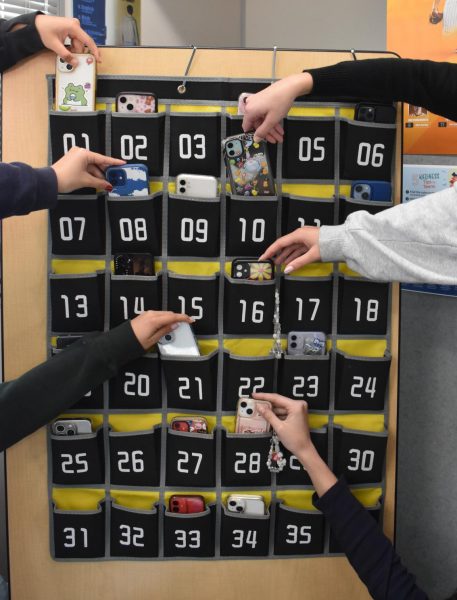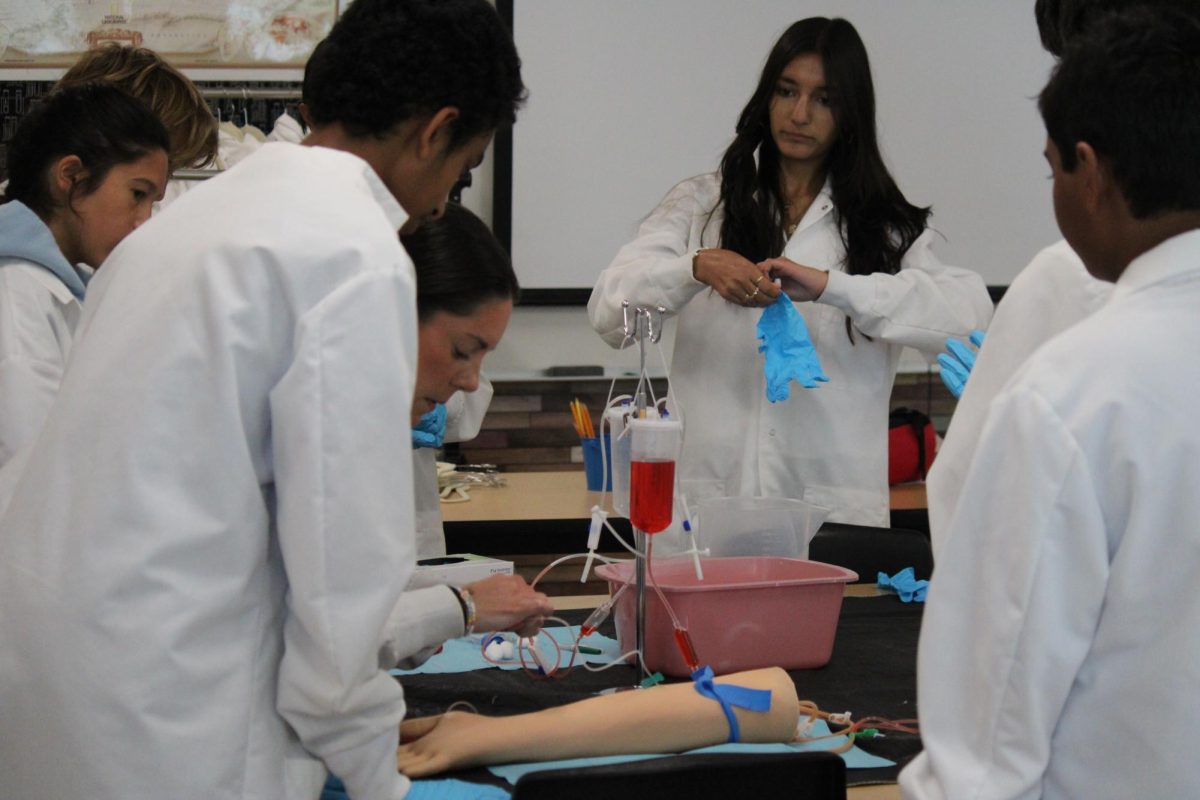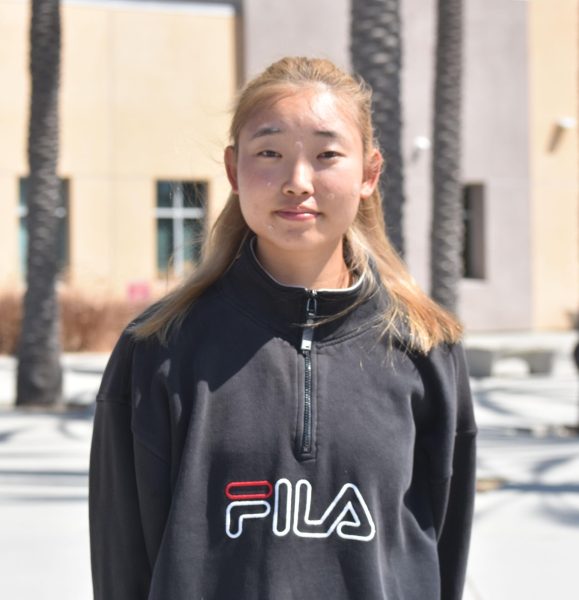
(Ella Jiang)
Since the beginning of 2022, the first thing CTE teacher Paul O’Beirne has his students do when they walk into his classroom is put their phones in their assigned pockets of a phone holder. Being frustrated with the level of distraction the phones were bring- ing into his classes, O’Beirne implemented a no-phone policy. Students must put their phones in their desig- nated pocket.
“It’s gotten to the point where I can just go and take attendance from the pocket,” O’Beirne said. “If the phone is not in the pocket, then [a student is] consid- ered absent unless they tell me why they don’t have a phone in their pocket.”
Like O’Beirne, English teacher Kimberly Bennett said she implemented this no-phone system because she saw many of her students fail to stay on task with the ready distraction of a cellular device.
“As most educators will tell you, there’s a direct link between the students who are addicted to their phones and low academic success,” Bennett said. “I was find- ing that a lot of my students who were struggling in class were also the students who were struggling to put their cell phones away.”
O’Beirne and Bennett said they saw improvements in their students’ quality of work and focus in class as a result of the phone holders.
After only a month of adhering to this policy, Ben- nett said she had students express gratitude for it.
“I’ve already had some students tell me that they’ve
really noticed a difference in their engagement in class and [in] paying attention,” Bennett said. “They didn’t realize how much they were actually on their phones in class.”
Ryan Kim (12) is in O’Beirne’s Intro to Finance class. He said that not having access to his phone during class makes his time in class more engaging.
“I can focus more and I’m definitely interacting with classmates a lot more,” Kim said. “The things I learned from [O’Beirne’s] class definitely stick with me.”
Kim said that one example of his increased engage- ment in O’Beirne’s class without his phone was when he spent his free time in the class researching a subject and talking to table mates instead of finding a distrac- tion.
“After we finished up on one of our assignments [on housing prices], we started exploring,” Kim said. “We went on Zillow and explored the housing prices near us. Having no phone in the class helps you dive deeper into what you’re learning.”
Suhana Suman (12) is in English teacher Jeff Wenger’s Expository Reading and Writing class, where a phone holder is used.
She said that she doesn’t believe phone holders are helpful in classrooms because they take away the chance for students to practice self-discipline of their own volition.
“The phone [holders] don’t keep students account- able because they don’t test the person’s individual re- sistance on phone use,” Suhan said. “Students are un- able to learn to distance themselves when the phone is with them.”
In order for these benefits to be reaped more widely, both O’Beirne and Bennett said they believe that these no-phone policies should be used by more teachers.
“Every teacher is fighting [phone distractions] every single day and we’re wasting so much time doing it,” O’Beirne said. “I’m not going to say it’s a downfall of our education system, but it’s not helping in any way.”
Bennett said she believes that there should be a school-wide policy preventing students from using their phones during class in order to improve consis- tency between classes.
“It’s important because then students know what to expect from classroom to classroom,” Bennett said. “When you’re trying to engage in academics, have ac- ademic conversations and high achievement, it’s not going to happen when you’re attached to your cell phone.”
Assistant principal Teri Heard said that this phone holder policy is not likely to become a school-wide policy, but that teachers will be supported if they want to implement the system in their classrooms.
“There’s not an administrative goal,” Heard said. “It would have to be teacher-driven. However, I would support any teacher that wanted help accessing funds to get [phone holders] if that’s something they wanted in their classroom.”
O’Beirne said that since he puts his own phone away during class, students should be held to the same stan- dard.
“I have a phone, I love my phone, I use my phone all the time, but I put it away during class,” O’Beirne said. “It’s gone for an hour and a half at any given point.”
Bennett said that her phone policy was made with her students’ best interests in mind.
“I want my students to be successful,” Bennett said. “If I have to enforce something that maybe they don’t like at first in order to show them that this will make them more successful, I’m willing to do that.”





![Jolie Baylon (12), Stella Phelan (12), Danica Reed (11), and Julianne Diaz (11) [left to right] stunt with clinic participants at halftime, Sept. 5. Sixty elementary- and middle-schoolers performed.](https://wvnexus.org/wp-content/uploads/2025/09/IMG_1948-800x1200.png)

